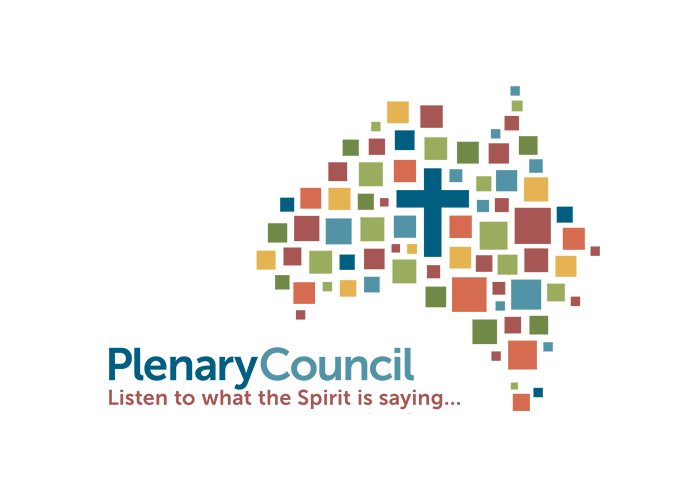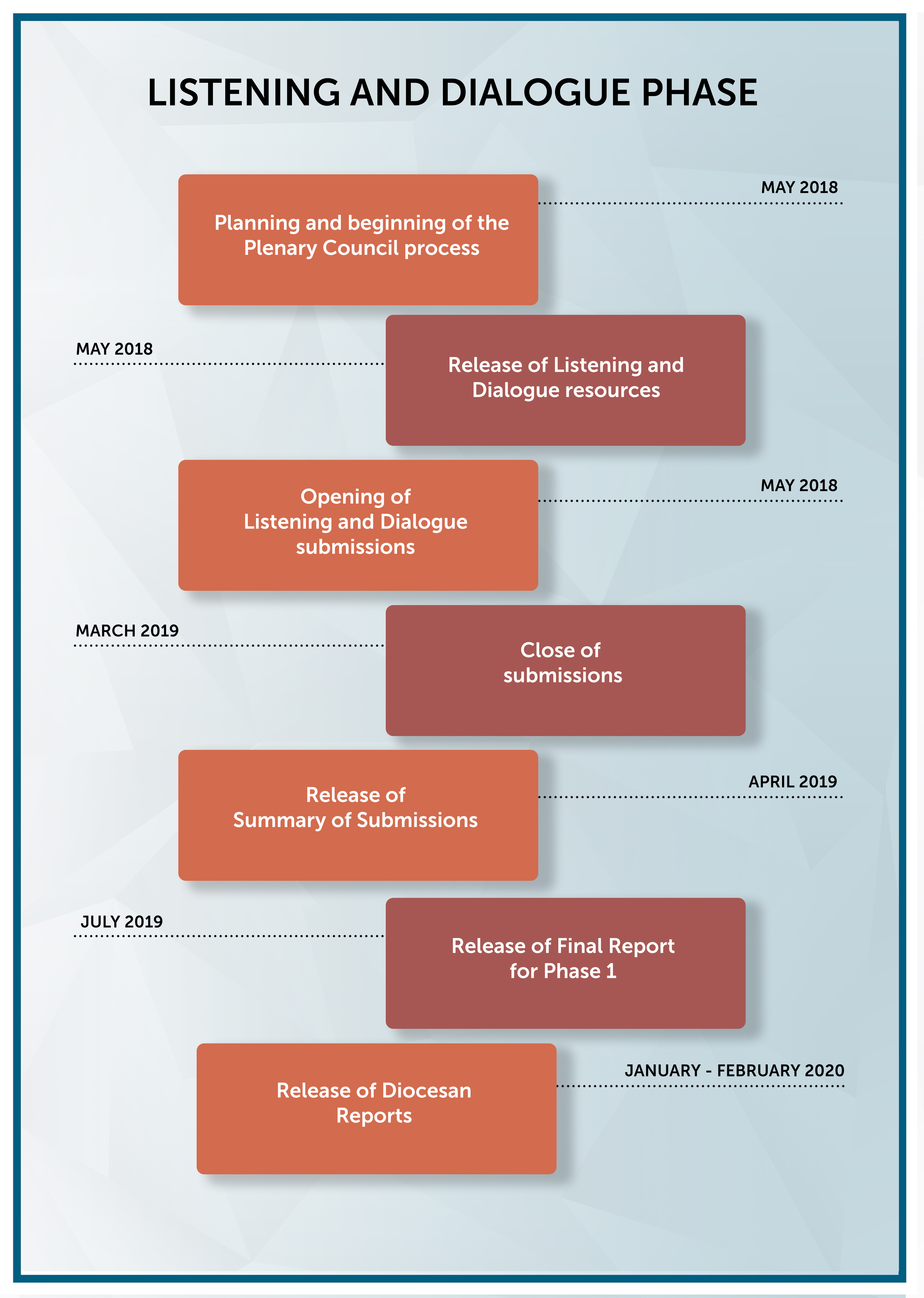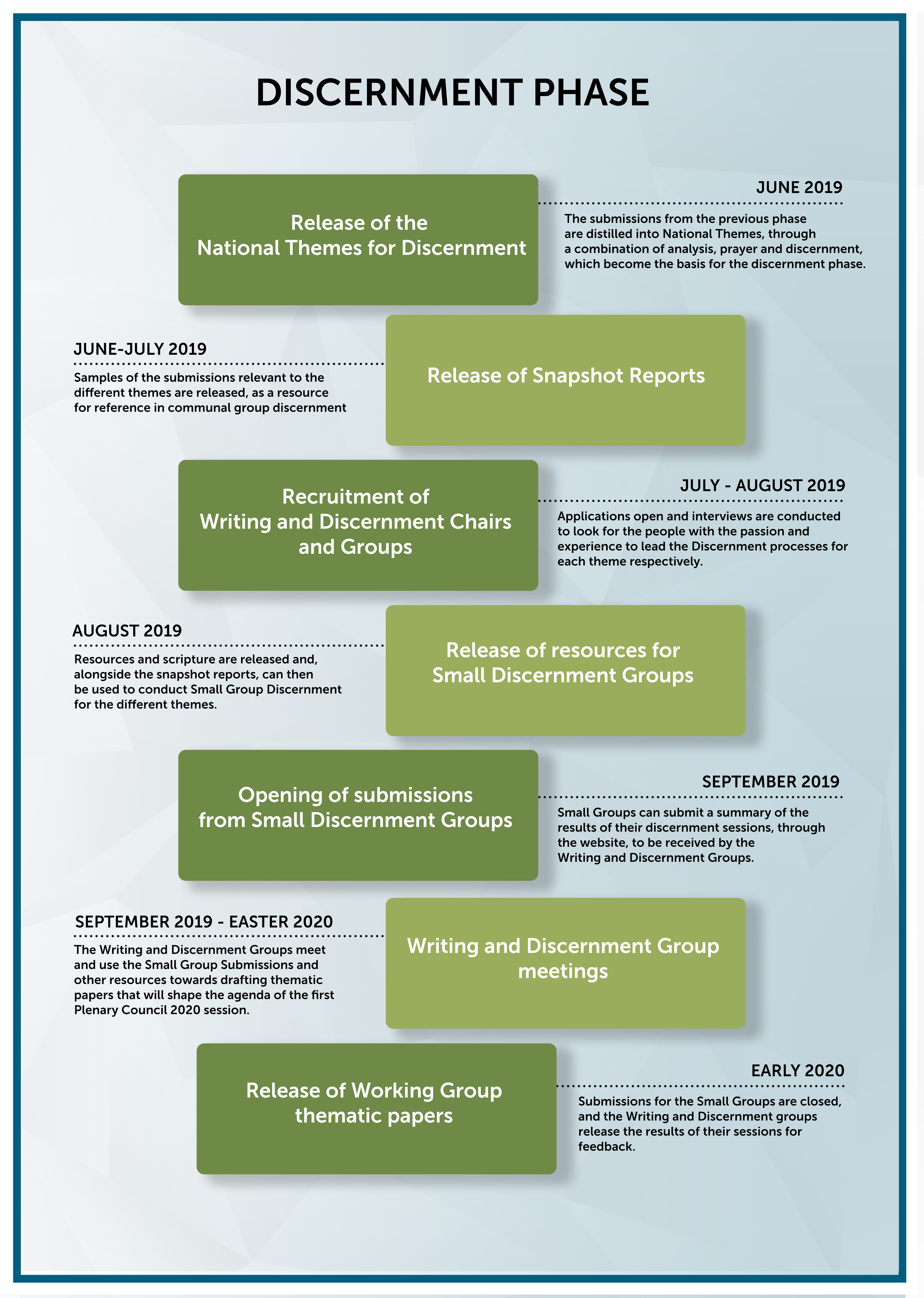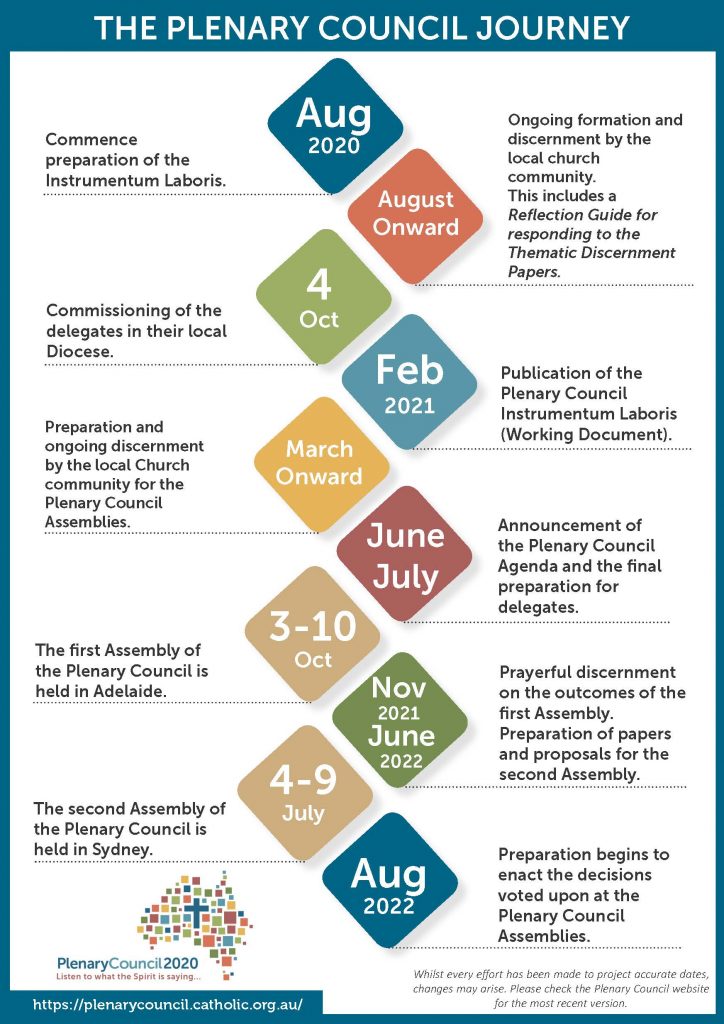Theology
A Plenary Council is a formal meeting of the bishops and other representatives of all the dioceses and eparchies of the Catholic Church in Australia. Its purpose is to discern what God is asking of us in Australia at this present time. While the church should be asking that question continually, a Plenary Council is a particularly graced instrument for seeking the Holy Spirit’s guidance. And it has the authority to make church laws on the results of its discernment.
Although in the end it will be the bishops who will vote on any future directions for the church in Australia, they will be making those decisions in the light of a long listening to the Holy Spirit speaking through the voices of any of the faithful who wish to speak around Australia. This makes the Plenary Council different from the last one in 1937. Everyone has a chance to participate and to express whatever the Spirit is saying to them in their heart.
From the Council of Jerusalem (Acts 15) through to the modern era most decisions of substance rested in the hands of councils or synods. The Council of Trent prescribed annual synods and the 1917 Code of Canon Law legislated for bishops to hold one every ten years. Finally, Vatican II desired, “that the venerable institution of synods and councils flourish with fresh vigour.” (Christus Dominus, 36)
Vatican II taught that the Church should be more dialogic and participatory in its processes, involving all the baptised in the Church. The council teaches that the whole Church has been given the gift of divine revelation, as well as the gift to interpret it faithfully. The bishops have a ministry of teaching that necessarily involves a process of listening to the voices of the faithful before they speak.
One of Pope Francis’ favourite quotes from Vatican II (Lumen Gentium, 12) concerns how the bishops have access to the Holy Spirit, so that they are faithfully interpreting and applying what God has revealed and is revealing. And that access comes through a special gift that all the baptised have received at their baptism when they are anointed with chrism. That gift is called “a sense for the faith” (sensus fidei). Moreover, the whole church together has this special gift, what is called “the faithful’s sense of the faith” (sensus fidelium).
Through this, Vatican II teaches, the Church is “infallible in believing”. So, this “sense of the faithful” is a sacred conduit for finding out what God is asking of us in Australia at this present time. The bishops’ role of “oversight” is to ensure that contemporary interpretations of divine revelation are faithful to the past. But, equally importantly, to ensure that God’s present activity in human history is being attended to. This is done by attending and interpreting to the signs of the times and listening to the faithful.
This, then, is what we hope to tap into during the preparatory stage leading up to the Fifth Plenary Council of Australia. We will be having “open dialogue and listening sessions”. Each person’s perspective will be valued. No individual has an infallible sense of the faith. We only have a sense of what God is wanting by allowing as many as possible to have a voice in the conversation God wants to have with the church. Singly we see a special viewpoint; together we see much more.
We hope over the next three years “to listen to what the Spirit is saying to the churches”. This was the instruction given to the seven churches of Asia Minor in the Book of Revelation. From that time on Christians have met to listen to the Spirit at times of important decisions. We are called to do so again.
Vatican II spoke of how God, who spoke in the past, “continues to converse” with the church (Dei Verbum, 8). Through our Plenary Council, the Catholic Church hopes to enter more intensely into that divine-human dialogue.
The last time the Catholic Church in Australia held a Plenary Council was in 1937. It has been more than 80 years since we gathered all of the Church together and much has changed. In 2020, we will have a Plenary Council about the future of the Catholic Church in Australia. What are we called to do? Who are we called to be? How do we need to change?
Pope Francis has spoken of the need to engage in the world and respond in faith. He said:
“The defining aspect of this change of epoch is that things are no longer in their place. Our previous ways of explaining the world and relationships, good and bad, no longer appears to work. The way in which we locate ourselves in history has changed. Things we thought would never happen, or that we never thought we would see, we are experiencing now, and we dare not even imagine the future. That which appeared normal to us – family, the Church, society and the world – will probably no longer seem that way. We cannot simply wait for what we are experiencing to pass, under the illusion that things will return to being how they were before.”
The journey toward the Plenary Council will help us to prepare to listen to God by listening to one another. We invite all people to engage, to be a part of the listening and dialogue encounter in the next two years.
Logo and Scripture
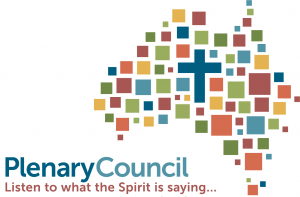
Logo and Scripture

We are blessed with great diversity in our Catholic Church in Australia – many perspectives, experiences and encounters of faith, walks of life and vision for Church. We are called to explore what it is that we are called to, how we are called to be the presence of Jesus in Australia for today, and for generations to come. United by faith, we shall:
“Listen to what the Spirit is saying.” Rev 2:7
The Plenary Council logo reflects a “community of communities”, drawing upon the message from Pope Francis about the nature of Church. He wrote in Evangelii Gaudium:
“It is a community of communities, a sanctuary where the thirsty come to drink in the midst of their journey, and a centre of constant missionary outreach.” EG28
2022
Fifth Plenary Council of Australia closes
ACBC Media Blog
The nine-month celebration phase of the Fifth Plenary Council of Australia ended on Saturday, with Council Members standing and applauding as president Archbishop Timothy Costelloe SDB formally declared the Council closed.
Plenary Council ‘re-imagines the Church through a missionary lens’
ACBC Media Blog
Plenary Council president Archbishop Timothy Costelloe SDB has encouraged Council Members to continue relying upon the Holy Spirit as they move into the future.
Second Plenary Council assembly ends on high note
ACBC Media Blog
On the final full day of the Plenary Council, Members have celebrated the passage of almost all motions contained in the Motions and Amendments document that formed the second assembly’s agenda.
Announcement of voting outcomes due at 6.30pm
ACBC Media Blog
Due to additional changes in the program for the Plenary Council’s second assembly, no deliberative vote outcomes were announced within the assembly on Friday morning.
Blessed Peter To Rot hailed as model of fidelity
ACBC Media Blog
Those gathered for the Fifth Plenary Council of Australia are following in the footsteps of the early Christians, Cardinal John Dew said at Mass on Thursday evening.
Plenary Council backs action on ecology, Church governance reform
ACBC Media Blog
Plenary Council Members have passed all six motions they considered on Thursday across parts of the agenda in the areas of Church governance and integral ecology.
Changes to program lead to change in voting plan
ACBC Media Blog
Due to a change in the program for the Plenary Council’s second assembly, no deliberative votes were cast on Thursday morning.
Homily urges Plenary Council Members to seek unity
ACBC Media Blog
As Wednesday’s proceedings came to a close, Members of the Fifth Plenary Council of Australia were invited to remember the “saving unity” to which the Church is called.
Members will reconsider two Plenary Council motions
ACBC Media Blog
The Members of the Plenary Council have spent Wednesday afternoon working together to reconsider a pair of motions that were not passed earlier in the day.
Deeper discernment invited during Plenary Council
ACBC Media Blog
Members of the Plenary Council are being invited to spend additional time to discern after two motions did not achieve a qualified majority in voting that has taken place over the past 24 hours.
Members of Plenary Council pray for Christian unity
ACBC Media Blog
Members of the Fifth Plenary Council of Australia were encouraged on Tuesday evening to embrace the “new and demanding urgency” of ecumenism.
Council Members hear wisdom from theological advisers
ACBC Media Blog
At the beginning of the second full day of the second assembly of the Plenary Council, members received input from two of the Council’s theological advisers — or periti — on topics being considered on Tuesday.
Outcomes of first six Plenary Council votes announced
ACBC Media Blog
The outcome of the initial rounds of voting for the Fifth Plenary Council of Australia have been announced, with all relevant motions being passed with a qualified majority.
Ukraine front and centre in Plenary Council Mass
ACBC Media Blog
At the end of the first full day of proceedings, the Members of the Fifth Plenary Council of Australia were invited to receive more deeply the Holy Spirit “who will console us and lead us to the truth”.
President gives opening address to second Council assembly
ACBC Media Blog
At the Council’s opening session on Monday morning, the Members of the Fifth Plenary Council of Australia were invited to carry “a deep consciousness of who we are” as the People of God, called to discipleship in the Australian context.
Second Plenary Council assembly opens in Sydney
ACBC Media Blog
The Members of the Fifth Plenary Council of Australia were urged to “cling to the cross” and “ask the Holy Spirit to help us” as they commenced the Council’s second assembly on Sunday evening.
Members set to gather for second Plenary Council assembly
ACBC Media Blog
The four-year journey of the Fifth Plenary Council of Australia is about to reach its high point, with Members gathering in Sydney this weekend for the start of the Council’s second and final assembly.
Messages of prayer, hope accompany Plenary members
ACBC Media Blog
People from across the country are sharing their hopes and their prayers with the 277 Members of the Fifth Plenary Council of Australia who will gather in Sydney for the second and final assembly next week.
Catholic, Christian leaders among Plenary Council observers
ACBC Media Blog
Leaders of the Catholic Church in the Asia-Pacific region and the head of the National Council of Churches in Australia are among those who will serve as observers at the second assembly of the Plenary Council.
Community invited to Plenary Council’s closing Mass
ACBC Media Blog
Archbishop Timothy Costelloe SDB is inviting the Catholic community to attend the closing Mass of the Fifth Plenary Council of Australia – the culmination of a four-year journey of renewal for the Church.
Motions framework published for second Council assembly
ACBC Media Blog
The 30 motions that will be considered during the second assembly of the Fifth Plenary Council of Australia in July, rising from four years of national conversation, have been published.
Catholics invited to surround Plenary Council in prayer
ACBC Media Blog
Catholics across the country are being invited to participate in a new prayer pilgrimage as the Church journeys towards the second assembly of the Fifth Plenary Council of Australia.
Plenary Council takes next step in discernment journey
ACBC Media Blog
The four-year journey of discernment for the Fifth Plenary Council took a step forward this week, with Council Members invited to reflect on proposals emerging from the Council’s first assembly, held in October.
2021
Brisbane Mass closes Plenary Council’s first assembly
ACBC Media Blog
A Mass celebrated by Australian Catholic Bishops Conference president and Brisbane Archbishop Mark Coleridge has closed the first general assembly of the Fifth Plenary Council of Australia this morning.
Plenary Council’s first assembly ‘inspiring, challenging’
ACBC Media Blog
As he closed the formal proceedings of the first general assembly of the Fifth Plenary Council of Australia Saturday evening, Archbishop Timothy Costelloe SDB reflected on a week that had been “inspiring, challenging and sometimes unsettling”.
Plenary members present final reports of first assembly
ACBC Media Blog
An impassioned call for “a prayer for the future of our common home, a Gospel for the home of our future generations” was made during the final reporting back on small group discernment by Plenary Council members today.
Plenary Council’s task: ‘Reveal the face of Christ’
ACBC Media Blog
Archbishop Peter A Comensoli in today’s Mass for the Fifth Plenary Council of Australia has said the Council’s task is to reveal the face of Christ – a face that blends cultures, languages, ethnicities and histories.
Plenary members focus on mission in God’s world
ACBC Media Blog
The concept of “sniffing out” the presence of God in the world, articulated by theologian Fr Richard Lennan in an address to the Fifth Plenary Council of Australia, struck a chord with many members as they continued their discernment.
Australia has helped shape Synod of Bishops
ACBC Media Blog
As Pope Francis prepares to launch the XVI Ordinary General Assembly of the Synod of Bishops, an Australian lay woman assisting the process says the Church in Australia has been a key supporter of the Synod.
A reflection for the Plenary Council
Catholic Outlook
On Sunday 3 October, the Plenary Council of the Australian Catholic Church will assemble for the first time. This is the end of a long process that began three and a half years ago. We now seem to live in a different country, in a different age. Its planning and initial stages began before the bushfires, before coronavirus, before the restrictions and lockdowns that have been part of our daily lives.
Plenary members focus on mission in God’s world
Melbourne Catholic
The concept of ‘sniffing out’ the presence of God in the world, articulated by theologian Fr Richard Lennan in an address to the Fifth Plenary Council of Australia, struck a chord with many members as they continued their discernment.
Plenary Council journey one for ‘dusty, patient pilgrims’
ACBC Media Blog
Maronite Archbishop Antoine-Charbel Tarabay OLM has spoken about the significance of the Eastern Catholic Churches and the Latin Rite Church coming together as “pilgrims” for the Fifth Plenary Council of Australia.
Plenary members consider how to bridge gap with Australia’s Indigenous
Catholic Voice
Brisbane Archbishop Mark Coleridge has signaled that the Fifth Plenary Council of Australia will offer Catholic Church backing for an Indigenous voice in the nation’s constitution.
Plenary Council: Women’s role in the Church
Catholic Voice
I am a proud Maronite Catholic, who, like much of my generation, has strong connections to the Latin Rite as well. I’m humbled by the opportunity to represent women from both Rites at this Council.
On this Plenary pilgrimage, humility and gratitude will enable us to serve the Lord
The Catholic Weekly
Brothers and Sisters in Jesus-Christ our Lord, “Who, then, is the faithful and wise slave whom his master has put in charge of his household to distribute to them their food at the proper time?”
Plenary Council to contemplate woundedness, seek new peripheries
ACBC Media Blog
Day four of the Fifth Plenary Council of Australia will take on a different feel, as members spend extra time offline, praying with and reflecting on questions about seeing through the eyes of those who have been abused and reaching those on the peripheries.
Integrating Indigenous Spirituality, a focus of the Plenary Council
Melbourne Catholic
In the voices of our group today, we heard the Spirit saying that being Indigenous and being Catholic are not two separate ways of being: they are two elements of spirituality that exist side-by-side for the First Nations People within our Church community.
Wednesday Plenary: What you might’ve missed
Melbourne Catholic
On Wednesday 6 October, the third morning Plenary was livestreamed for public viewing. In case you weren’t able to tune in, here are a few things you missed.
Members unpack big questions facing the Church
ACBC Media Blog
The 278 members of the Fifth Plenary Council of Australia have continued to break open the 16 questions related to how we can create a more missionary, Christ-centred Church in Australia at this time.
Council Members begin communal work of discernment
The Southern Cross
“Where two or three are gathered in my name, there I am in their midst…” This is the message behind the prayer resources that have been developed for the First Assembly of the Plenary Council by Mercy Sister and Director of Liturgy for the Archdiocese of Perth, Sr Kerry Willison RSM.
Council Members begin communal work of discernment
ACBC Media Blog
The first “spiritual conversations” of the Fifth Plenary Council of Australia covered a broad range of thoughts and topics from Baptism being the place for fundamental conversion to the need for the Church to tend to its past and current failures.
Archbishop Fisher: ‘Be Powerhouse of Prayer’
ACBC Media Blog
As the first general assembly of the Fifth Plenary Council of Australia nears the halfway point, Archbishop Anthony Fisher OP has preached on the power of prayer and trust in the Holy Spirit.
Sense of hope, responsibility as Plenary assembly begins
ACBC Media Blog
Restricted to being a virtual assembly due to the pandemic, members in Adelaide said they felt fortunate to be able to still gather throughout this week at Archbishop’s House.
Council members begin work of communal discernment
ACBC Media Blog
The first “spiritual conversations” of the Fifth Plenary Council of Australia covered a broad range of thoughts and topics from Baptism being the place for fundamental conversion to the need for the Church to tend to its past and current failures.
Australia’s grand experiment in synodality opens amid hopes, challenges
Crux
ROME – Long before “synodality” became the buzzword of this pontificate, and long before a world-wide summit on the topic was called for by Pope Francis that’s being described as his legacy, the Catholic Church in Australia was getting ready to launch its own major synodal moment.
Pope sends blessings to historic Church event
ACBC Media Blog
Pope Francis has sent greetings and blessings from Rome as the program for the Fifth Plenary Council of Australia, the first such event in this country in 84 years, began today.
‘Listen deeply’ for the Holy Spirit, Plenary Council members advised
The Catholic Leader
ONE of the youngest participants in Australia’s historic Plenary Council meeting is taking seriously the advice “to listen deeply for the voice and to be alert to the leadings of the Holy Spirit”.
St Francis a model for Australia’s Plenary Council
ACBC Media Blog
On the Feast of St Francis of Assisi, Bishop Shane Mackinlay has said the saint that so loved creation and those living in poverty can inspire the work of the Fifth Plenary Council of Australia.
Australian Plenary Council opens with call to be courageous
UCA News/Catholic News Service
In their Plenary Council process, the Catholics of Australia have been called, like the biblical patriarch Abraham, “to step into a future which he could not control and which he did not fully understand,” said Archbishop Timothy Costelloe of Perth.
Australian bishops begin nine-month Plenary Council
Catholic News Agency
The Fifth Plenary Council of Australia kicked off Sunday with an opening Mass in Perth to begin its first assembly taking place online Oct. 3-10.
Opening Plenary: 3 things you might’ve missed
Melbourne Catholic
On Monday 4 October, the Opening Plenary Session kicked off the main portion of the Plenary Council’s First Assembly. For those who weren’t tuned in to the live stream, here are three highlights you missed.
Catholics in Australia urged: ‘Become true disciples’
ACBC Media Blog
As Archbishop Timothy Costelloe SDB opened the Fifth Plenary Council of Australia, he said Catholics “must become, even more than we are already, a community of true disciples”.
Catholic community invited to share in Council journey
ACBC Media Blog
People across Australia and beyond will be able to follow the progress of the Fifth Plenary Council of Australia through Masses and livestream sessions when the first general assembly opens this weekend.
Campion President named adviser on Plenary Council
ACBC Media Blog
Dr Paul Morrissey has been appointed as an adviser to the Fifth Australian Plenary Council from next month.
A Gift Of God – The 5th Plenary Council of Australia
Catholic Voice
What is the mark of the Holy Spirit?… of God’s Spirit? In the gift of the Plenary Council, we have a blessed time to recognise this answer. This week we ask and listen: What is the Spirit saying to the Church in Australia?
Hopes at the dawn of the Plenary Council First Assembly
ACBC Media Blog
“Walking together” (synod/synodality) is the “language” of our Council and of our Church. We are like the Emmaus disciples (Luke 24, journeying but with a sense of anticipation of more to be discovered. We know that this walking together does not simply refer to our feet.
EXCLUSIVE: Historic Plenary Council Opening Mass to be celebrated in Perth
The Record
After nearly five years of planning and 84 years since the last plenary council in 1937, the Fifth Plenary Council of Australia will open with Mass at St Mary’s Cathedral this Sunday 3 October at 11am WST.
Looking back to the Plenary Council of 1937
Catholic Voice
Most people are surprised to hear that there have been four previous councils, but the most recent was held in 1937, probably well before any of the current participants were born!
Your guide to the Plenary Council
The Southern Cross
There are many reasons for having a Plenary Council: Pope Francis has invited the local Church to dialogue; the contemporary society of Australia has changed significantly; and the Royal Commission into Institutional Response to Child Sexual Abuse has been a significant and influential event that requires deep consideration and response.
‘Spiritual conversations’ will aid Plenary Council discernment
ACBC Media Blog
A key component of the Plenary Council’s assemblies will help members to consider the 16 questions that make up the Council agenda.
In Plenary Council, Australians search for ‘a new way of living as church’
Crux
WASHINGTON, D.C. — As part of the listening and dialogue phase of the Australian Catholic Church’s Plenary Council, 220,000 Australians answered the question, “What do you think God is asking of us in Australia at this time?”. In 2015, Australian Archbishop Mark Coleridge was asking himself something similar. Australia was in the midst of a government-mandated investigation into sexual abuse in the church. Australian Catholics were leaving the church.
Sharing hopes with Members of the Plenary Council from Diocese of Parramatta
Catholic Outlook
For the first time in 84 years, the entire Catholic Church in Australia is gathering to make important decisions about the future. This gathering, the First Assembly of the Plenary Council, will bring together voices, opinions and hopes from all around the country and encourage listening, dialogue and discernment.
Archbishop Costelloe: ‘Pray with us and for us’
ACBC Media Blog
Plenary Council president Archbishop Timothy Costelloe SDB is inviting Catholics across Australia to pray with and pray for Council members during the upcoming first general assembly.
Advisers, chairpersons named for Plenary Council
ACBC Media Blog
Some of the country’s leading Catholic thinkers have been engaged to support the members of the Fifth Plenary Council of Australia when they gather for the first general assembly early next month.
Youngest member prepares for historic Plenary Council
ACBC Media Blog
A quietly-spoken 20-year-old university student and youth minister from the regional New South Wales city of Orange is set to make history in October as the youngest member of the Fifth Plenary Council of Australia.
Priest hopes Council will reawaken the baptised
ACBC Media Blog
As the Church in Australia journeys towards the first assembly of the Fifth Plenary Council of Australia, the first since 1937, the question asked by many is how the Church has changed since that last gathering.
How Australia made the journey to a plenary council
ACBC Media Blog
There have been times when I wondered if we would ever make it. But after all the delays and changes of plan, we have come at last to the first assembly of the Plenary Council, which has quite a pre-history.
Technology in place for first Plenary Council assembly
ACBC Media Blog
Despite large parts of the country being in lockdown, those planning the Fifth Plenary Council of Australia say all is in readiness to deliver the first assembly in October wholly online.
Religious Leaders Commissioned ahead of Plenary Council Assembly
Catholic Religious Australia
Over 120 people gathered on Zoom on the 4 August in a Commissioning Ceremony of the 45 members of Religious Congregations and Institutes of Apostolic Life who are preparing to attend the forthcoming Assembly of the Fifth Plenary Council of Australia.
On the road to the Plenary assembly
The Southern Cross
Prayer and her belief that the Holy Spirit is guiding the process is helping Kiara Ryan prepare for her participation in October’s Plenary Council assembly – that and everything she will learn while on the road with her family in the coming months.
Plenary Council members share their hopes for first session in October
THREE Brisbane-based religious women and men will bring the voice and experience of their vocation to the Plenary Council’s first session in October.
Bishop Vincent: ‘My hope for the Plenary Council’
Catholic Outlook
With a few months to the first session of the long-awaited Plenary Council (PC2020), we are finally headed down the home stretch. The initial phase of listening drew nearly 220,000 people across Australia and 17,500 individual and group submissions.
Plenary Council agenda calls for missionary, Christ-centred Church
ACBC Media Blog
The agenda of the Fifth Plenary Council of Australia calls those attending the Council assemblies to “develop concrete proposals to create a more missionary, Christ-centred Church in Australia”.
Australian bishops formally convoke Plenary Council
ACBC Media Blog
The Australian Catholic Bishops Conference has formally convoked the Fifth Plenary Council of Australia, with its president Archbishop Mark Coleridge signing the required decree on Pentecost Sunday.
Prayer campaign launched for assembly countdown
ACBC Media Blog
People across the country are being invited to join a months-long prayer campaign in the build-up to the first assembly of the Fifth Plenary Council of Australia, starting on October 3.
Assembly crucial in shaping future of local Church
The Southern Cross
A Diocesan Assembly planned for September, together with the ongoing Plenary Council, will play a “crucial” part in shaping the future of the Catholic Church in Australia, according to respected local theologian Fr James McEvoy.
Catholic Church must embrace ‘synodality’
The Tablet
Embracing a synodal model of the Church is “messy” but it offers the only path to a “future that’s worth having”, says a leading Australian bishop.
Working document released for Plenary Council journey
ACBC Media Blog
The working document for the Fifth Plenary Council of Australia provides a catalyst for the Church to renew the journey of prayer and discernment toward the first assembly in October, Archbishop Timothy Costelloe SDB says.
Catholic youth have a ‘deep yearning for Christ’ says plenary delegate Chris Lee
The Catholic Weekly
Sydney’s youngest Plenary Council delegate, Chris Lee, said there is a ‘deep yearning for Christ’ among Australia’s Catholic youth as he shared his experience in youth ministry – a perspective he hopes to voice at the council in October.
Flame of Plenary comes to Parramatta
Catholic Outlook
On Thursday night, the nine delegates who have been appointed from the Diocese of Parramatta for the Fifth Plenary Council of Australia met face-to-face for the first time and received the Plenary Council flame.
2020
Flame of Plenary comes to Parramatta
Catholic Outlook
On Thursday night, the nine delegates who have been appointed from the Diocese of Parramatta for the Fifth Plenary Council of Australia met face-to-face for the first time and received the Plenary Council flame.
Plenary Council assembly mixes in-person, online format
ACBC Media Blog
The first assembly of the Plenary Council will take place with a combination of online and face-to-face participation as uncertainty remains over restrictions on travel and gatherings.
Discernment, an ongoing journey for delegate
The Record
Plenary Council President, Perth Archbishop Timothy Costelloe SDB addressed the delegates at a recent prayer, discernment and dialogue session, on 4 November.
Reflecting on a Synodal Church
The Southern Cross
Acting Chancellor and Plenary Council local coordinator Sarah Moffatt said the forum was also an opportunity to start preparing for a Diocesan Assembly next year and the re-engagement of a Diocesan Pastoral Council.
Archbishop: Advisers helped shape Plenary Council journey
ACBC Media Blog
Archbishop Timothy Costelloe SDB says the executive committee that has helped guide the Plenary Council journey to this point have set the Council up to be a source of renewal for the Church.
Armidale commissions Plenary Council delegates
Cathnews
Armidale Diocese’s Plenary Council delegates were commissioned at a Mass at Saints Mary and Joseph Cathedral in Armidale on Sunday.
Forum planned for Plenary journeys
The Southern Cross
Plenary Council local coordinator Sarah Moffatt said COVID-19 had thrown many unexpected challenges in 2020, including the postponement of the first assembly of the Plenary Council until October 2021.
Darwin Diocese commissions Plenary Council delegates
ACBC Media Blog
The Diocese of Darwin last night became the first local Church to commission their delegates for the Fifth Plenary Council of Australia, the first assembly of which will open in Adelaide in 12 months’ time.
Plenary lay delegates discuss their hopes, dreams for the process
The Record
Two Plenary Council Perth lay delegates feature in The eRecord’s latest podcast recording on Friday 11 September for an in-depth discussion about their hopes and dreams for the process.
Plenary Council may be delayed but the thematic papers show the fruit of communal discernment
The Record
The Church’s Plenary Council 2020 assemblies may have been delayed due to COVID-19, but six writing and discernment groups have been busy, using their diverse expertise and backgrounds to write thematic papers.
The importance of the need to be an evangelising Church in Australia was emphasised at a recent free Plenary Council seminar, titled “Towards the Plenary Council 2020: Understanding a Missionary and Evangelising Church.”
PLENARY COUNCIL: Discernment captures perfectly the task
The Record
The key to what we can do and must do to contribute to the rebuilding and renewing the Church lies in a careful consideration of what fidelity to the Lord and the Lord’s will for the Church look like.
Discernment papers help sharpen focus for Plenary Councils
ACBC Media Blog
Archbishop Timothy Costelloe SDB says the six discernment papers for the Fifth Plenary Council of Australia signify the latest milestone as the Church considers its present circumstances and discerns its future.
Plenary Council Sessions Postponed Until 2021 and 2022, an Opportunity to Use ‘Extra Time Wisely’
ACBC Media Blog
The long-anticipated Plenary Council 2020 sessions, the first of which had been scheduled for this October, were pushed back to October 2021 and April 2022 because of the COVID-19 pandemic.
Dates locked in for Plenary Council assemblies
ACBC Media Blog
The two assemblies for the Fifth Plenary Council of Australia will be held in Adelaide from October 3-10, 2021, and in Sydney from July 4-9, 2022.
Discernment ‘is not comfortable’
Melbourne Catholic
Taking time out to pray and discern is deeply counter-cultural – even for an institution as old as the Catholic Church, says Plenary Council 2020 facilitator Lana Turvey-Collins.
Plenary Council assemblies set for 2021 and 2022
ACBC Media Blog
The two assemblies for the Fifth Plenary Council of Australia will now take place in October 2021 and April 2022, following the disruption of the original schedule due to the COVID-19 pandemic.
Queensland theologian looks to plenary council with hope for renewed spirit of Second Vatican Council
The Catholic Leader
Reverend Associate Professor Ormond Rush: “The Church needed to renew itself in order to be more pastorally effective and would speak to the realities of people’s lives in the mid 20th century then, but in any age.”
Diocese rep a voice for parishioners
mnnews.today
Only 267 delegates throughout Australia have been called to attend the Plenary Council sessions. Ms Gibson will be representing the Diocese of Maitland-Newcastle, along with Helen Belcher, Bishop Bill and Fr Andrew Doohan..
Albany Creek parishioner Tom Warren wants to bring youth issues to the plenary table
The Catholic Leader
Albany Creek parish youth co-ordinator Tom Warren took one look at the list of Brisbane archdiocese’s Plenary Council 2020 delegates and thought, “Oh my gosh, those are some fantastic people”.
First assembly of Plenary Council postponed
ACBC Media Blog
In response to the dramatic changes caused by the COVID-19 pandemic, the bishops of Australia have made the “difficult, but necessary” decision to postpone the first assembly of the Plenary Council.
Delegates named for celebration of Plenary Council
ACBC Media Blog
Plenary Council president Archbishop Timothy Costelloe SDB has written to more than 250 other Catholics across the country, calling them as delegates for the Fifth Plenary Council of Australia.
Student Plenary Assemblies – Archdiocese of Brisbane
Archdiocese of Brisbane
From late 2019 to early 2020, 29 Catholic Secondary Schools from regional and metropolitan areas of the Archdiocese of Brisbane joined together as part of the Plenary journey through a process of Communal Discernment. This is a snapshot of that Plenary experience.
2019
Discernment and Writing Groups draw on Church’s talent
ACBC Media Blog
Seventy people from across the country – including a dozen bishops – will serve on the six Discernment and Writing Groups that will help the Plenary Council build towards its first session in October 2020.
Time to ‘Listen and Discern’ for Plenary Council
ACBC Media Blog
Plenary Council president Archbishop Timothy Costelloe SDB says the involvement of Catholics across the country remains critical as the Council’s Listening and Discernment stage ramps up.
Adelaide visit part of Plenary Council preparations
ACBC Media Blog
The Bishops Commission for the Plenary Council and its Executive Committee have met in Adelaide for the first time, 14 months before the Council’s opening session in the South Australian capital.
Plenary Council process gets a rural perspective
ACBC Media Blog
Catholics in the Western Australian diocese of Geraldton have provided a strong rural voice during the preparation phase of the three-year Plenary Council 2020 process. The Geraldton Diocesan Conference 2018, drawing on Psalm 118, adopted the theme of “Lamp for the Steps and Light for the Way: Listen to God and each other as we light the way forward.”
Dioceses join in the Plenary Council spirit
ACBC Media Blog
Maitland-Newcastle Bishop Bill Wright has convoked a diocesan synod commencing in November this year, one of a number of events around the country building towards the Plenary Council and beyond.
Faithful tell Plenary 2020 they want a Christ-centred Church
Catholic Weekly
After consulting more than 222,000 of the Catholic faithful on what they think God wants of the Church in Australia, six National Themes have been discerned for consideration by Plenary Council 2020. The Themes show a “clear desire” for a Christ-centred Church, president of the Plenary Council Archbishop Timothy Costelloe SDB, said.
Applications open for Plenary Council discernment groups
ACBC Media Blog
On July 1, the Plenary Council opened applications for the Discernment and Writing Groups that will play a critical role in helping the Catholic Church move forward in considering the Council’s six National Themes for Discernment.
Broken Bay launches Year of Discernment
Catholic Diocese of Broken Bay
The Diocese of Broken Bay, from where a very large number of submissions to the Plenary Council came, has launched a Year of Discernment. The period has been dedicated to discernment in order to “discover together the concrete path that God is calling us on as individuals and as a community of Christians”, a diocesan statement said.
Source: Catholic Diocese of Broken Bay
Perth Catholics called to fidelity, second Plenary phase launched
Catholic Archdiocese of Perth
The Archdiocese of Perth was quick to launch the second phase of preparation for the Plenary Council — Listening and Discernment — with a special Mass on June 2, the Feast of the Ascension.
Plenary Council 2020 take a major step forward with release of national themes for discernment
The Catholic Leader
PLENARY Council 2020 has moved into its next preparation phase with an announcement of six national themes for discernment that emerged from a historic process of listening to the voices of more than 222,000 people.
Announcement of National Themes for Discernment opens next phase for Plenary Council
ACBC Media Blog
The Plenary Council 2020 moves into its next phase of preparation today with the announcement of the National Themes for Discernment that emerged from a historic process of listening to the voices of more than 222,000 people.
Discernment helps voices transform into Plenary Council themes
ACBC Media Blog
A combination of data analysis, prayer and reflection has helped the Plenary Council 2020 process move from the voices of more than 222,000 people across the country to a number of National Themes for Discernment.
Listening and Dialogue ‘landmark moment’ for Church
ACBC Media Blog
While people were still sharing their stories of faith and of God with the Plenary Council last night and the final numbers won’t be known for a couple of weeks, the Council’s Listening and Dialogue stage is considered a “landmark moment” for the Catholic Church in Australia.
Five weeks left for Listening and Dialogue phase
ACBC Media Blog
Plenary Council president Archbishop Timothy Costelloe SDB says he’s expecting another flood of responses from people across the country during the final five weeks of the “Listening and Dialogue” phase of the Council.
2018
Christmas Massgoers invited to share story, shape future
ACBC Media Blog
With Catholic parishes across the country set to be full to overflowing next week, the Christmas season is being seen as a great time to increase participation in Plenary Council 2020.
November surge takes Plenary Council numbers past 30,000
ACBC Media Blog
The Plenary Council 2020 received more than 2000 submissions during November, matching the number of responses the landmark process had received in the previous five months combined.
Seeking a Plenary Council fit for purpose
Eureka Street
“What we need is a listening and inclusive Church — a Plenary Council at which the clergy and the laity have a proper place at the table, at which the voices of the ‘rusted-on’ and the ‘cheesed-off’ Catholics are heard and at which the bishops are respectfully listening as much as speaking,” Fr Frank Brennan SJ writes.
Listening to the Spirit: 10,000 voices and climbing
ACBC Media Blog
Momentum is building as the Church reaches the midway point of the Open Listening and Dialogue phase of preparations for the Plenary Council in 2020.
Melbourne parish takes outreach to next level
Melbourne Catholic
Parishes, dioceses, ministries, schools and other Catholic groups across Australia are coming up with creative ways to promote the Plenary Council and get people involved. One Melbourne parish has taken it to the streets, erecting billboards.
Youth ministers embrace Plenary process
Catholic Outlook
A gathering of 400 youth ministers has used the Plenary Council’s Listening and Dialogue process to craft a submission to the official Plenary Council process, but also to inform their own ministry.
Townsville locals see great potential in Plenary Council
ACBC Media Blog
The northern Australia tour continued for Plenary Council facilitator Lana Turvey-Collins recently when delivered five sessions over three days in the Townsville Diocese, presenting to more than 130 people.
Dozens gather in Cairns for Plenary Council conversation
ACBC Media Blog
More than 70 people from across Far North Queensland came together in Cairns last week in the latest of regular diocesan gatherings that are helping local communities commence the three-year Plenary Council process.
Pope Francis sends blessings as Plenary Council process begins
ACBC Media Blog
Pope Francis has sent his support and blessings to the Catholic Church in Australia as it commences a three-year process to consider its future through the Plenary Council 2020.
Adelaide will host opening Plenary Council session in 2020
ACBC Media Blog
The first of two historic national gatherings to consider the future of the Catholic Church in Australia will be held in Adelaide in October 2020, the Australian Catholic Bishops Conference has announced.
Perth Archdiocese set to launch Plenary Council process on 26 May
The Record
Archbishop Timothy Costelloe SDB will launch the 2020 Plenary Council process this month during the Vigil Mass of Trinity Sunday on 26 May at 6pm. In announcing the launch, Archbishop Costelloe affirmed this will be a momentous occasion for the Catholic Church in Australia and carries with it the hopes, dreams and aspirations of everyone involved.
Plenary 2020 to shape the future of the Catholic Church in Australia
The Catholic Weekly
The Plenary Council in 2020—as the highest form of communion possible between local churches and dioceses within a country—will actually determine Church legislation in Australia.
New ACBC president to make sure ‘Jesus is at the heart of everything’
The Catholic Leader
“The Plenary Council isn’t a talkfest; it’s a time to discern, decide and act. If we do that under the influence of the Holy Spirit, things will change in unexpected and hope-filled ways.”
WA leaders come together to talk Plenary 2020
The Record
Leaders from across the WA Catholic community have gathered to talk about and prepare for the upcoming Plenary Council scheduled for 2020, themed “Listen to what the Spirit is saying”.
Plenary Council 2020: Our Journey in Faith
Broken Bay News
Broken Bay Diocese director of evangelisation Daniel Ang explains how the Plenary Council 2020 will unfold – and particularly how Broken Bay will prepare for and participate in the process.
Port Pirie, Broome lead the way for Plenary Council
ACBC Media Blog
More than 200 people from remote and rural parts of Port Pirie Diocese in South Australia have met for the first major gathering since the announcement of the 2020 Plenary Council.
Pope Francis approves Plenary Council for Australia
ACBC Media Blog
Pope Francis has given his approval for the Catholic Church to hold the first Plenary Council – the most significant national gathering that can be held – in Australia in more than 80 years.
2022
-
Plenary Post Edition 49
When the Plenary Council process began, it was always spoken of as a three-stage journey: Preparation, Celebration and Implementation. Well, after four-and-a-half years, the People of God in Australia have reached that third stage.
-
Plenary Post Edition 48
After almost four-and-a-half years, thousands of meetings, and untold prayers, we find ourselves just two days away from the opening Mass of the second general assembly of the Fifth Plenary Council of Australia.
-
Plenary Post Edition 47
If counting down to milestones is your thing, we today find ourselves 38 days away from the Mass to open the second assembly of the Fifth Plenary Council of Australia, with the Council's formal program to begin the following day on July 4. More than 300 people -- members, advisers, observers and support personnel -- will be in Sydney to see the celebration stage of the Plenary Council reach its conclusion.
-
Plenary Post Edition 46
“For more than four years, we have sensed the power of prayer and the presence of the Holy Spirit in the work of the [Plenary] Council. As we move towards the development, consideration and approval of key proposals to renew the Church in Australia, the need for prayer has never been greater."
-
Plenary Post Edition 45
The Plenary Council is a journey for the whole Catholic Church in Australia, but it is being celebrated in various ways across the country and interacting with other local, national and international processes.
-
Plenary Post Edition 44
What's happening at the moment? What are the key milestones coming up? I've been hearing about the Synod of Bishops -- can I still get involved?
-
Plenary Post Edition 43
One of the questions that we're seeing a lot these days relates to how the Plenary Council and the international "Synod on Synodality" align, or how they might differ. In reading some of the foundational documents for the Synod on Synodality, the Australian Plenary Council experience is cited often as something of a model for how the Synod invites the People of God into a shared journey of dialogue, of discernment and of prayer.
2021
-
Plenary Post Edition 42
Earlier this month, a document gathering up the fruits of the first general assembly of the Fifth Plenary Council of Australia was published, again inviting the People of God across the country to engage with the work undertaken by the Council's almost 280 members.
-
Plenary Post Edition 41
After the busyness of the lead-up to the first general assembly of the Plenary Council and the intensity of that week, there needed to be something of a "recovery" period, allowing the outcomes of those days to settle and be distilled for the journey to the second assembly in July.
-
Plenary Post Edition 40
All the years of preparation for a Plenary Council didn't necessarily prepare the Church in Australia for what the first general assembly would become -- an online gathering, with most Members joining the assembly from their own home, helping discern how the Church can be renewed in and through Christ.
-
Plenary Post Edition 39
In less than 24 hours, the Opening Mass for the Fifth Plenary Council of Australia will be celebrated at St Mary's Cathedral in Perth. It will be a focal point for the Church in Australia as a journey that has its origins two decades ago finally commences the nine-month period of celebration, with the Second General Assembly scheduled for July 2022.
-
Plenary Post Edition 38
It is almost three-and-a-half years to the day since we announced that Pope Francis had given his approval for the Catholic Church in Australia to hold a plenary council. It was a long journey from the seeds of a national gathering until that approval, and the time since the official period of preparation began has seen the Church traverse drought, bushfire, floods and an ongoing pandemic.
-
Plenary Post Edition 37
The Steering Team for the Plenary Council's assemblies, with sub-committees across a range of key areas, are ramping up preparations for the first assembly, which opens on October 3. Council president Archbishop Timothy Costelloe SDB will celebrate the opening Mass at 11am AWST (2pm AEDT), which will be livestreamed from St Mary's Cathedral in Perth on the Council website.
-
Plenary Post Edition 36
With much of greater Sydney in lockdown and two other states having just emerged from lockdown, there is a sense of comfort in knowing that all the planning for a multi-modal Plenary Council assembly in October means we are ready for all eventualities. That is not to say there aren't a lot of plans to be finalised, but we are well prepared to support the Council's members and the Catholic community through the days of the assembly.
-
Plenary Post Edition 35
As we sit 101 days before the first Plenary Council assembly, momentum is building in preparation for the assembly and within the broader Catholic community. While the focus can be on the assembly and the Members who will attend -- bishops, priests, religious and lay faithful -- the journey continues to be one for the whole Church in Australia.
-
Plenary Post Edition 34
There are a number of important and uplifting stories below, including about a couple of milestone moments at Pentecost -- the launch of a new prayer campaign and the Council's formal convocation.
-
Plenary Post Edition 33
There was a sense of extra energy in parishes over Easter, having lived through the first suspension of public Masses in decades last year, including during Holy Week. Some dioceses used the occasion to commission Plenary Council members, with large numbers of people gathered for Mass.
-
Plenary Post Edition 32
There has been a sense through this Plenary Council journey that the Catholic world is following what is happening in Australia closely. With just two other plenary councils having taken place in the past 60 years around the world, and none with the level of dialogue and discernment of the Australia process, there's significant interest in what will unfold.
-
Plenary Post Edition 31
There are just 219 days until the opening of the first assembly of the Plenary Council. And while there is a sense of deja vu about that, with significant preparations taking place early last year before the assemblies were delayed by 12 months, there's also renewed energy -- some of which is captured in the stories below.
2020
-
Plenary Post Edition 30
As 2020 draws towards its conclusion, it would have been hard to imagine 12 months ago how much our world -- and our Plenary Council journey -- would change in the subsequent year.
-
Plenary Post Edition 29
The contribution of more than 220,000 people from across the country during the Listening and Dialogue phase of the Plenary Council set the foundation for the journey towards the Council's assemblies. But there was a group that was planting the seeds of this historic journey even earlier.
-
Plenary Post Edition 28
If not for the COVID-19 pandemic, delegates from across Australia would be descending on Adelaide this weekend for the opening assembly of the Plenary Council. The pandemic has put people's lives on hold in many ways, and the Council is no different.
-
Plenary Post Edition 27
The postponement of the Plenary Council assemblies by 12 months has been both a blessing and a challenge. One of the blessings has been the additional time to consider how we can be a Christ-centred Church in Australia with a clearer understanding of how COVID-19 is changing the country and the Church.
-
Plenary Post Edition 26
The postponement of the first assembly of the Plenary Council by 12 months might have seemed like a slowing down of the Council journey, but lots of work continues to proceed. Groups around the country are unpacking the six discernment papers that were published at Pentecost. One diocese is making that task easier with the provision of podcasts of the papers' text.
-
Plenary Post Edition 25
As some parts of the country return to something closer to normal, there's a sense of relief that the two assemblies of the Plenary Council -- previously postponed due to COVID-19 -- are locked in. We will gather in Adelaide in October 2021, 12 months later than we had planned, for the first assembly. The second assembly will be held in Sydney in July 2022.
-
Plenary Post Edition 24
The past couple of weeks have been bittersweet ones for the Plenary Council. On March 23, we announced the more than 250 delegates that have been called to the Plenary Council, providing a ray of good news in the midst of a Church and a country consumed by the COVID-19 pandemic.
-
Plenary Post Edition 23
Many of the key groups helping the Church prepare for the Fifth Plenary Council in Australia and its two assemblies -- the first in Adelaide this October -- have met over the past couple of weeks.
-
PlenaryPost Edition 22
The build-up to the Fifth Plenary Council of Australia has, in many ways, been a long process. The origins of the Council go back almost 20 years, as the Australian bishops considered St John Paul II’s call in his apostolic letter Novo Millennio Ineunte for the Church to consider its place in contemporary society.
2019
-
Plenary Post Edition 20
Over a period of six weeks, the Plenary Council team, in partnership with the National Centre for Pastoral Research (NCPR), published a series of "snapshot reports" relevant to each of the six National Themes for Discernment. This past Sunday, the NCPR published the final report to summarise the Listening and Dialogue phase of the Plenary Council.
-
Plenary Post Edition 19
The month since the launch of the second phase of preparing for the Plenary Council – Listening and Discernment – has been a busy one on both sides of the world.
-
Plenary Post Edition 18
The Plenary Council process so far has been an exercise in listening, in dialogue, in conversation -- in changing the way the People of God communicate with one another, under the guidance of the Holy Spirit.
-
Plenary Post Edition 17
The end of the Listening and Dialogue phase of the Plenary Council last month in some ways marked a public "pause" in the process, allowing the people of God to focus on preparing for and celebrating the great feast and season of Easter. During this period, significant work is taking place to review and analyse the submissions and lay the groundwork for the second phase: Listening and Discernment.
-
Plenary Post Edition 16
It covered almost 10 months and culminated in a flurry of late submissions, but the Listening and Dialogue phase of the Plenary Council has yielded a remarkable foundation from which the people of God can move forward.
-
Plenary Post Edition 15
With the last Plenary Council in Australia having been held more than 80 years ago and with there being no real “prototype” for a national council of this type in the world, it was unclear how the Australian people would participate – especially in the opening Listening and Dialogue phase.
-
Plenary Post Edition 14
With just over two weeks to go until the “Listening and Dialogue” phase of the Plenary Council concludes, momentum is still strong and people’s stories are being shared as frequently as ever.
-
Plenary Post Edition 13
As Archbishop Timothy Costelloe SDB, the Plenary Council 2020 president, said last week, it was hard to know how many people would grasp the opportunity to consider “what God is asking of us in Australia at this time”. Through the end of 2018, the answer was “more than 40,000” – people who either shared their own story or took part in a gathering that led to a group submission.
2018
-
Plenary Post Edition 12
It's hard to believe that 2018 is already coming to a close. It's also hard to believe that the Plenary Council's Listening and Dialogue phase has been going for seven months already. Time has flown by and people's stories of life and faith have flooded in.
-
Plenary Post Edition 11
Much of the focus for the Plenary Council so far has been on the primary question that the Council is considering: "What do you think God is asking of us in Australia at this time?" That is the first of three pieces of stimulus that people are invited to reflect upon when making a submission to the Council.
-
Plenary Post Edition 10
With more than 5 million people ticking "Catholic" on the last Australian Census, the Plenary Council was always going to be ambitious in its efforts to connect with and hear from a large number of people.
-
Plenary Post Edition 9
As more and more people across the country learn about the Plenary Council process and realise they are able to help shape the agenda for the Council, stories of conversations taking place in innovative ways are emerging.
-
Plenary Post Edition 8
People working in Church communications – for dioceses, religious orders, schools and other ministries – gathered in Queensland last week for a triennial conference with the theme “Communicating Hope and Trust”, taken from one of Pope Francis’ messages for World Communications Day.
-
Plenary Post Edition 7
The Catholic Church in Australia, like many in the western world, has been undergoing a quite radical transformation in recent years. The history of the Church here was largely forged by people with British, Irish and European heritage – just as the nation’s history was influenced by those cultures.
-
Plenary Post Edition 6
Observant readers of PlenaryPost will notice that today’s edition has come out on a Wednesday, not a Tuesday. That’s because today is one of the highlights of the Catholic year, as we stop and commemorate the life and legacy of St Mary of the Cross MacKillop. Mary MacKillop was a person who recognised the need for her and her Sisters to be adaptable to their circumstances.
-
Plenary Post Edition 5
When the Church decided to hold a Plenary Council to consider the future of the Catholic Church in Australia, it naturally became a focal point for many people. We know that the success of the Council will depend largely on how the people of God choose to participate -- or not -- with the process.
-
Plenary Post Edition 4
The first seven weeks of the Plenary Council's Listening and Dialogue process have flown by and submissions continue to flood in through the Plenary Council's website. In the next edition of PlenaryPost we'll let you know what you're telling us about what you think God is asking of us in Australia at this time.
-
Plenary Post Edition 3
It's been another busy fortnight as the Plenary Council marks one month since the official launch at Pentecost. Momentum is building as people across Australia get together in groups, download the Listening and Dialogue guide, get together for conversation and then are sending their responses in online. More than 120 responses have already been received.
-
Plenary Post Edition 2
Welcome to the second edition of PlenaryPost, the Plenary Council e-newsletter. It has been a busy two weeks since the official launch of the Plenary Council 2020 process at Pentecost. As we outline below, many dioceses have held local events to mark the launch and dozens of people have already held Listening and Dialogue sessions and made a submission to the Plenary Council team.

(Acts 2:42-46)
How is God calling us to be a Christ-centred Church in Australia that is a joyful, hope-filled and servant community?
As we move into this second stage of preparation for the Plenary Council, we continue to seek the wisdom of the Holy Spirit. Beginning in July 2019, we are called to reflect on Scripture, Church teaching and good practice, to discern the answer to this question. The fruits of what is discerned during this time will shape the agenda of the first session of Plenary Council in October 2021.
This National Theme for Discernment is inspired by the voices of the People of God who expressed a yearning for the Church to be a sign of God’s kingdom for all people in Australia – to be able to see the Catholic Church in action, and to recognise Jesus. There was an expression of faith-filled hope in the capacity of the Catholic community to celebrate together, to show what it is to be a follower of Christ and to be loved unconditionally by God. There was a call to contemplate the Gospel call to be a servant Church for the good of all people in Australia – particularly for refugees and asylum seekers and other people who are vulnerable or at risk. Many responses called for greater sharing of the story of the good works done by so many people and organisations of the Church. Some responses expressed a hunger for strong witness of faith, especially by priests, young people and female leaders in parish and school ministries.
Responses to Discernment (Phase 2)
Read the Responses to Discernment for this theme so far.
Snapshot Report
See a sample of the voices and answers that inspired this theme. Use this to help your group during communal discernment.
More Reports
Download Diocesan Reports and "Listen to what the Spirit is Saying - Final Report for the Plenary Council Phase 1: Listening and Dialogue"
More Reports
Access the Thematic Paper by the Writing and Discernment Group or see papers for the other themes.
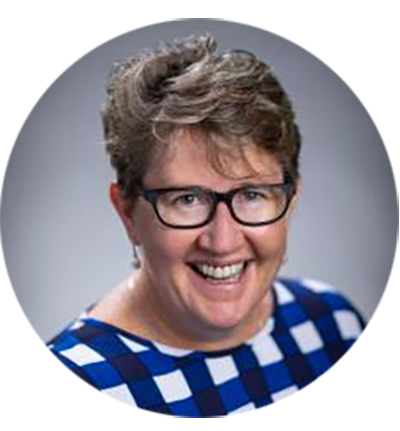
Chair
Sharon O’Keeffe 42, QLDMy whole life has been couched in a quest to live a life like Jesus’, one which is framed in the pursuit of justice and couched in the quest for sharing the love of Christ. I am passionate about working collaboratively and hope that I would be able to bring my listening and writing skills to this important ministry.
We are in a unique time for our Church, here in Australia and beyond. My modus operandi is joy and Pope Francis’ exhortation Evangelii Gaudium – on The Joy of the Gospel – fills my heart with hope that Australian Catholics will engage in the Plenary Council process.
Members:
- Denis Fitzgerald 65, VIC
- Fay Gurr 60, NT
- Deacon Adrian Gomez 46, NSW
- Bishop Columba Macbeth-Green 51, NSW
- Donna McLaughlin 59, NSW
- Margaret O'Donnell 72, VIC
- Br Damien Price 63, QLD
- Bishop Robert Rabbat 51, NSW
- Vincent Restifo 31, WA
- Ben Smith 44, TAS
What people talked about
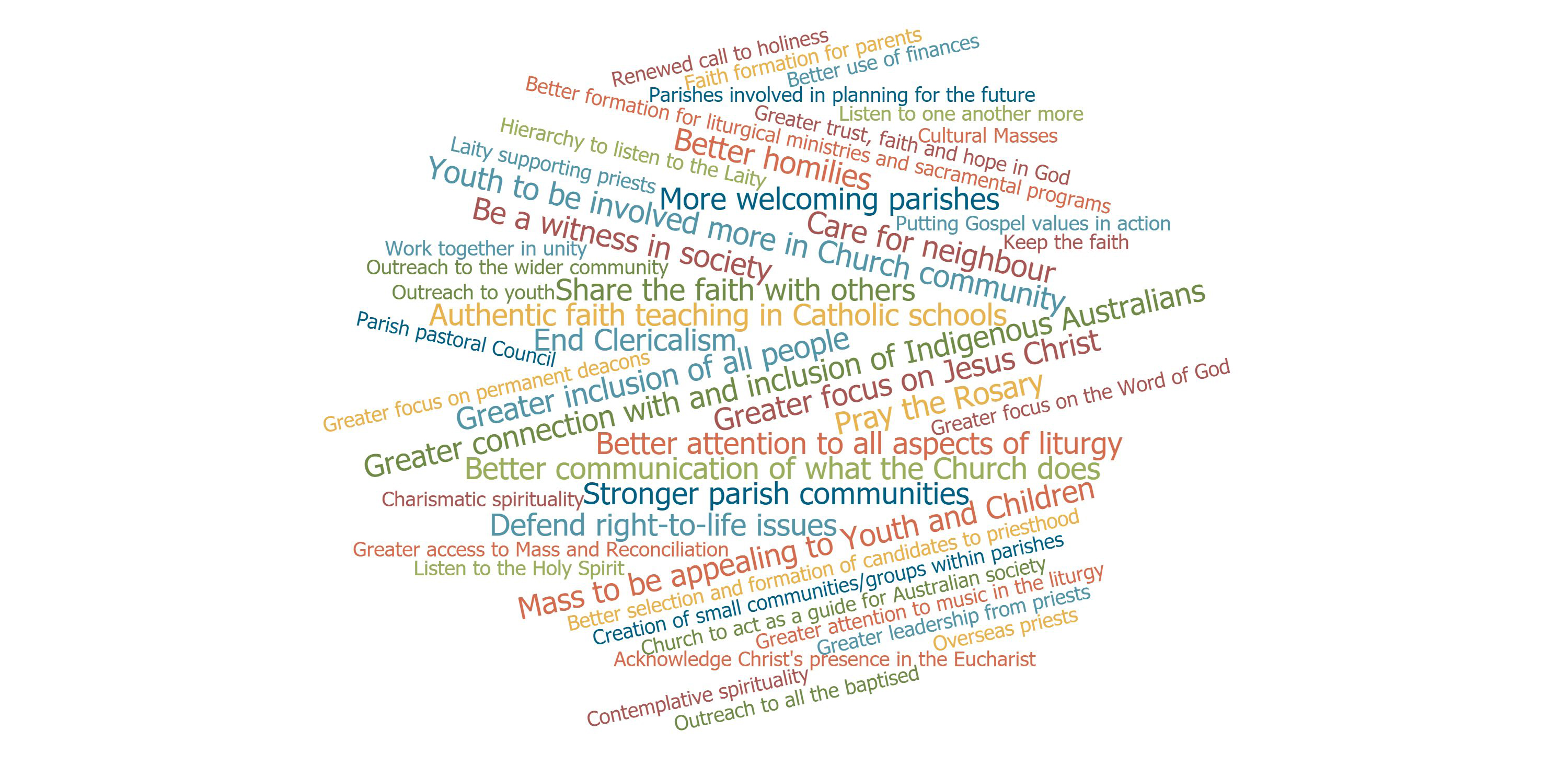
Disclaimer: Colour and size of text were randomly generated for aesthetic purposes and must not be taken as data visualization
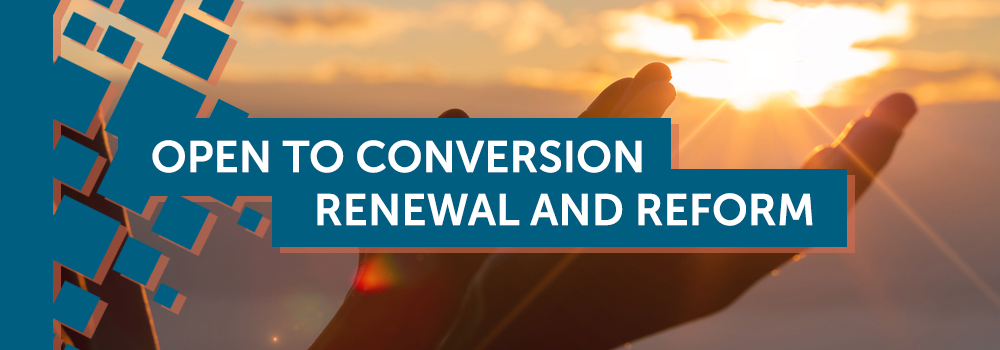
(Mark 1:14-15)
How is God calling us to be a Christ-centred Church in Australia that is open to Conversion, renewal and reform?
As we move into this second stage of the Plenary Council journey we continue to seek the wisdom of the Holy Spirit. Beginning in July 2019, we are called to reflect on Scripture, Church teaching and our contemporary situation, in order to discern the answer to this question. The fruits of what is discerned during this time will help shape the agenda of the first session of Plenary Council in October 2021.
This National Theme for Discernment is inspired by the voices of the People of God who expressed a desire to do things differently in response to Christ and the experience of our people, accepting that faithfulness to tradition requires change that is both personal and communal. Respondents also affirmed the important role of the clergy, expressing their appreciation for their vocation and recognising the need for support and ongoing formation and accompaniment. Some asked for a consideration of alternative approaches to ordained ministry, some for a greater inclusion of laity and different groups in the Church’s life, some for new models of governance and leadership, and some for a renewed fidelity to the Church’s teachings. There was also a call for a renewed life of prayer and communion with one another, including understanding the many different ways in which we encounter God and experience a conversion of heart.
Responses to Discernment (Phase 2)
Read the Responses to Discernment for this theme so far.
Snapshot Report
See a sample of the voices and answers that inspired this theme. Use this to help your group during communal discernment.
More Reports
Download Diocesan Reports and "Listen to what the Spirit is Saying - Final Report for the Plenary Council Phase 1: Listening and Dialogue"
More Reports
Access the Thematic Paper by the Writing and Discernment Group or see papers for the other themes.
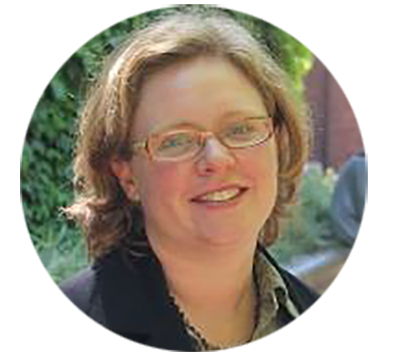
Chair
Renee Kohler-Ryan 43, NSWI think that this theme will enable the Church in Australia to reflect on herself, so as to appreciate what needs to be considered afresh, particularly in order to serve and protect the needs of the most vulnerable in our communities. I include families, who are under increasing pressure in Australian society, in this category.
Secondly, my research has been in the thought of St Augustine, for whom a major theme is lifelong renewal and conversion. Finally, I would like to think through, with the members of the group, ways that we can support the clergy without falling into the problems of clericalism. This will involve the whole Church in Australia thinking anew what Christ is asking of us.
Members:
- William Brennan 20, QLD
- Garry Everett 78, QLD
- Lawrence Hallinan 55, NSW
- Jennifer Hickson 40, NSW
- Bishop Ken Howell 61, QLD
- Fr Kevin Lenehan 55, VIC
- Bishop Vincent Long 57, NSW
- Elise M. 35, NSW
- Patricia Hindmarsh 74, TAS
- Loretta Wholley 48, ACT
What people talked about
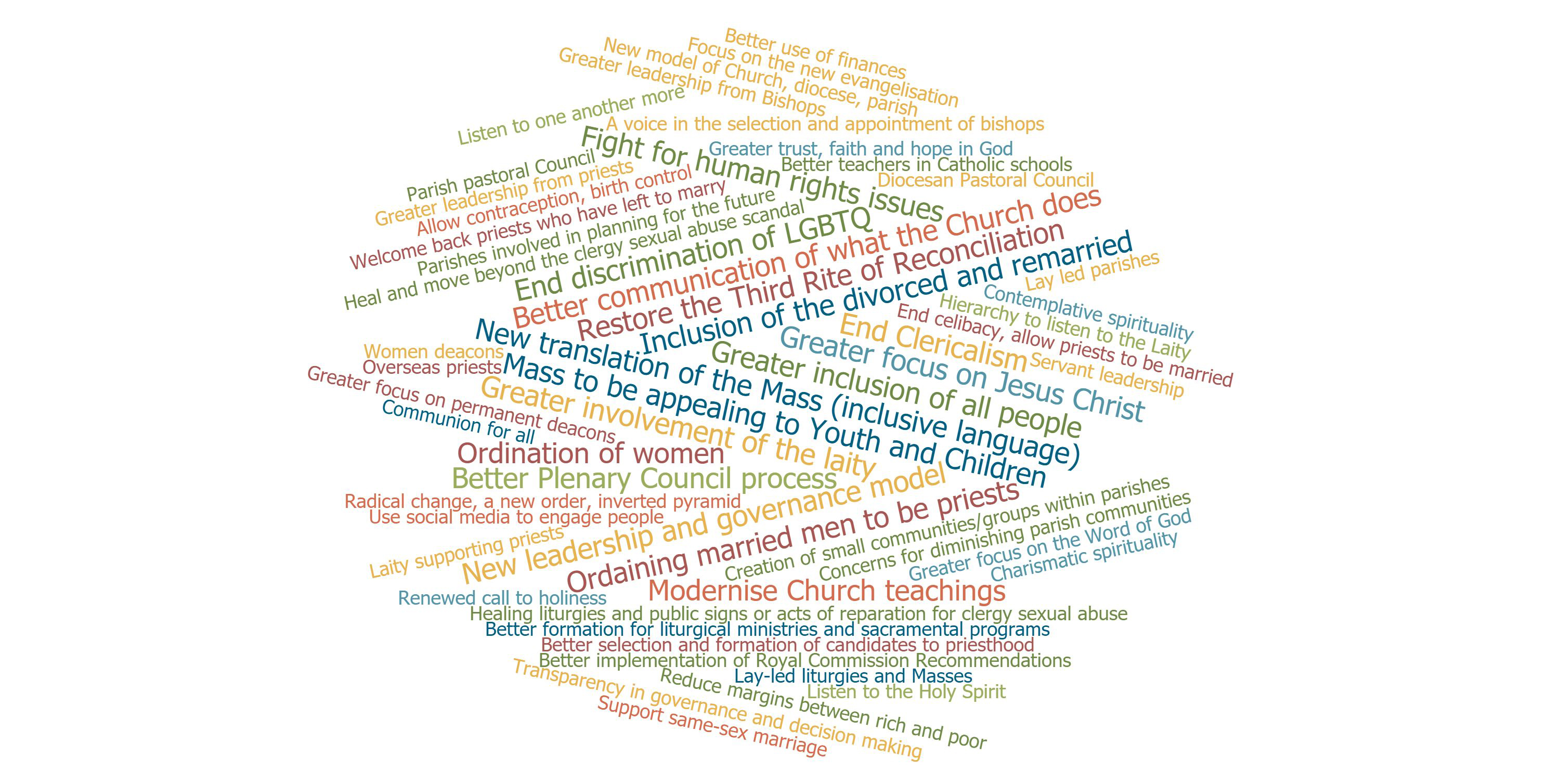
Disclaimer: Colour and size of text were randomly generated for aesthetic purposes and must not be taken as data visualization
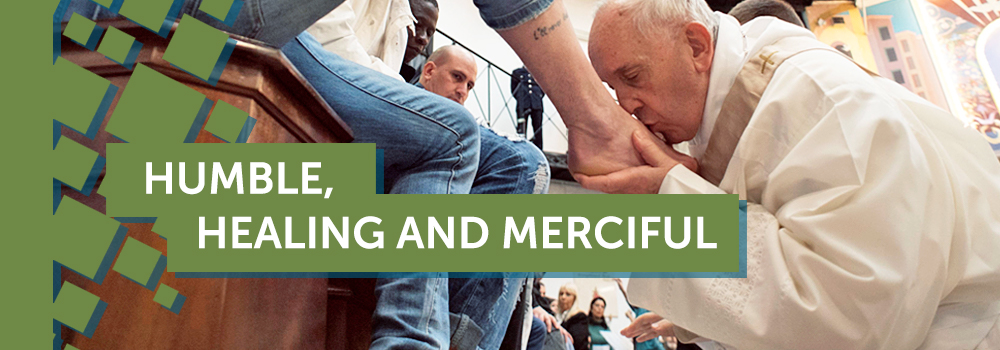
How is God calling us to be a Christ-centred Church in Australia that is humble, healing and merciful?
As we move into this second stage of the Plenary Council journey we continue to seek the wisdom of the Holy Spirit. Beginning in July 2019, we are called to reflect on Scripture, Church teaching and our contemporary situation, in order to discern the answer to this question. The fruits of what is discerned during this time will help shape the agenda of the first session of Plenary Council in October 2020.
This National Theme for Discernment is inspired by the voices of the People of God who expressed a deep and faith-filled trust in God and a need for lament and healing within the Church, acknowledging the sexual abuse crisis as a turning point for the Church in Australia. It identified the need for relationship and reconciliation among many within the Catholic community, and with the wider Australian society, particularly with Australia’s First Peoples and with all of creation. A desire was expressed for stronger prayer and sacramental life and more effective outreach to those who seek healing, as a renewed openness to and sign of God’s mercy.
Responses to Discernment (Phase 2)
Read the Responses to Discernment for this theme so far.
Snapshot Report
See a sample of the voices and answers that inspired this theme. Use this to help your group during communal discernment.
More Reports
Download Diocesan Reports and "Listen to what the Spirit is Saying - Final Report for the Plenary Council Phase 1: Listening and Dialogue"
More Reports
Access the Thematic Paper by the Writing and Discernment Group or see papers for the other themes.

Chair
Selina Hasham 50, NSWHaving been involved in a number of group exercises for the Listening and Dialogue stage, I felt inspired to consider if there might be a way I could continue to make a contribution to the outcomes of the Plenary Council.
I recognise the Plenary Council is a genuine impulse to listen to what the Spirit is saying to the Church in Australia and I wish to serve in a way that helps the very best response to emerge.
Members:
- Belinda Chapman 42, TAS
- Bernard Cumming 53, NSW
- Deacon Jim Curtain 63, VIC
- Simon Donahoe 75, VIC
- Bishop Charles Gauci 67, NT
- Sr Margaret Ghosn 49, NSW
- Caitlin Humphrys 33, QLD
- Sr Rachel McLoughlin 49, VIC
- Rhonda O’Connor 53, VIC
- Archbishop Christopher Prowse 65, ACT
- Flora Minsun Suh 31, NSW
What people talked about
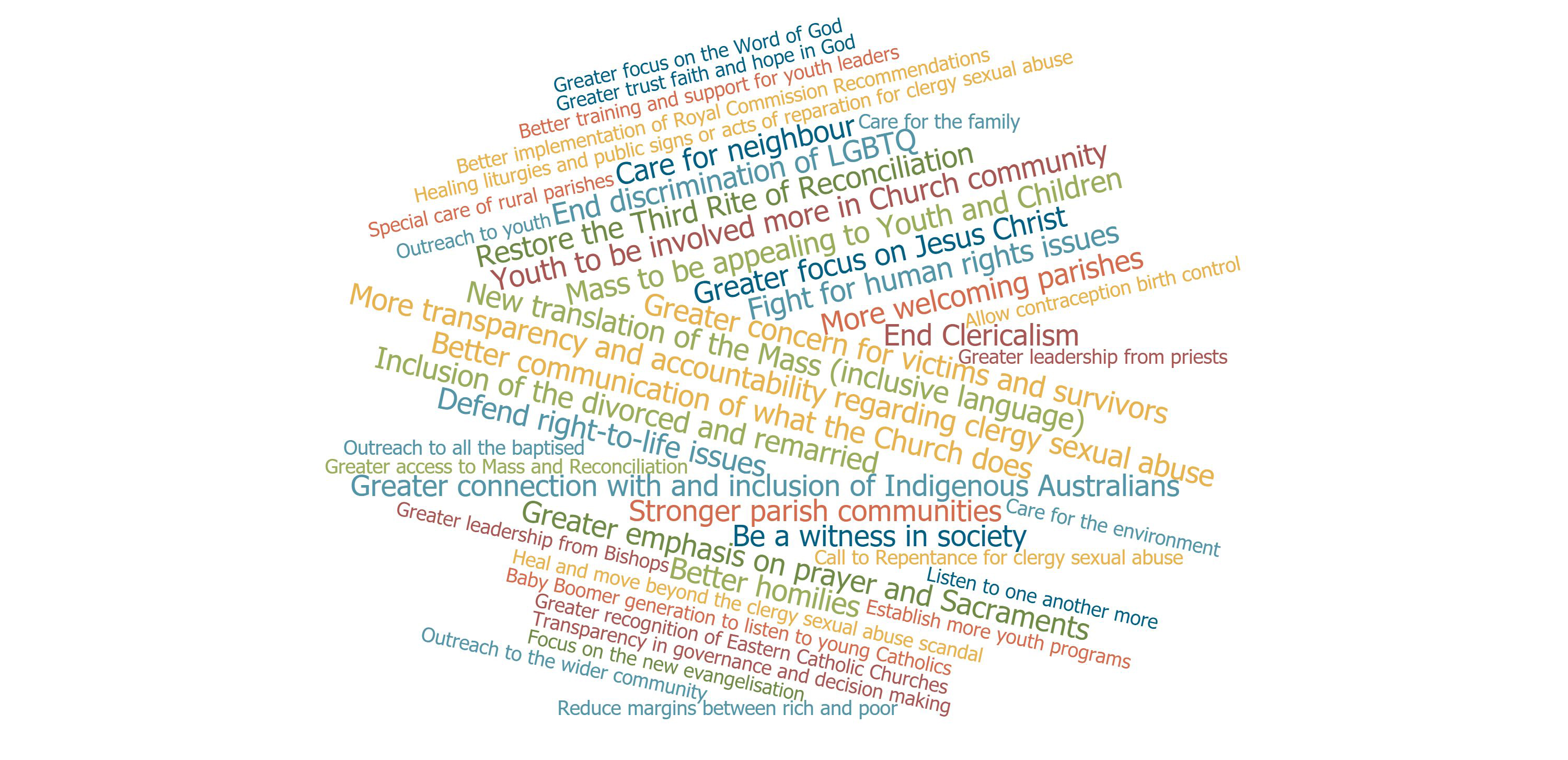
Disclaimer: Colour and size of text were randomly generated for aesthetic purposes and must not be taken as data visualization
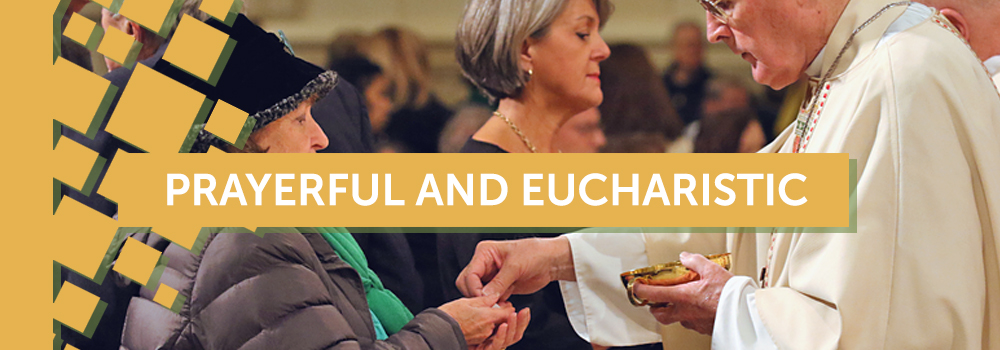
(Luke 24:30-31)
How is God calling us to be a Christ-centred Church in Australia that is prayerful and Eucharistic?
As we move into this second stage of the Plenary Council journey we continue to seek the wisdom of the Holy Spirit. Beginning in July 2019, we are called to reflect on Scripture, Church teaching and our contemporary situation, in order to discern the answer to this question. The fruits of what is discerned during this time will help shape the agenda of the first session of Plenary Council in October 2021.
This National Theme for Discernment is inspired by the voices of the People of God who shared how deeply they treasured the Eucharist and the sacramental and liturgical life of the Church. There was a call for stronger and more engaging preaching, with an emphasis on the Word of God and connection to daily life, some seeking a uniquely Australian expression of prayer and Eucharistic celebration, drawing from the wisdom and rituals of the Aboriginal and Torres Strait Islander people and also bringing together the many migrant communities which make up the Church in Australia. There were many divergent expressions of ways in which people and communities encounter God through their experiences of prayer, music and liturgy, and a desire for catechesis, training and formation for those in ministries related to these.
Responses to Discernment (Phase 2)
Read the Responses to Discernment for this theme so far.
Snapshot Report
See a sample of the voices and answers that inspired this theme. Use this to help your group during communal discernment.
More Reports
Download Diocesan Reports and "Listen to what the Spirit is Saying - Final Report for the Plenary Council Phase 1: Listening and Dialogue"
More Reports
Access the Thematic Paper by the Writing and Discernment Group or see papers for the other themes.
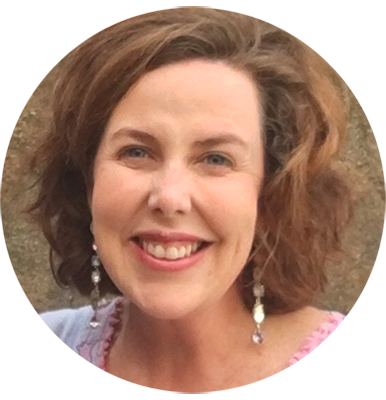
Chair
Catherine Connors 43, QLD
It has been inspiring to bear witness to the passion that the People of God in Australia have for change as they seek ways to strengthen their relationship with God and each other.
Our group are listening deeply to the ‘sensus fidelium’ as we discern how we are being called to be a Christ-centred Church that is prayerful and Eucharistic.
Members:
- Fr Yuhanna Azize 62, NSW
- Bishop Paul Bird 70, VIC
- Sr Moira Broderick CSB 81, VIC
- Fr Justin Darlow 39, NSW
- Philippe Dulawan 32, NSW
- Bishop Greg Homeming 61, NSW
- Jesse Mowbray 37, NSW
- David Nelson 40, NSW
- James O’Brien 32, VIC
- Sr Clare Sciesinski PBVM 71, WA*
- Matthew Smith 59, NSW
- Bernadette Sullivan 31, VIC
*Sr Clare Sciensinki PBVM, former chair of this group, has since passed away. We are thankful for her leadership and the spirit she brought to the team in the days that she spent with us. She will be greatly missed.
What people talked about
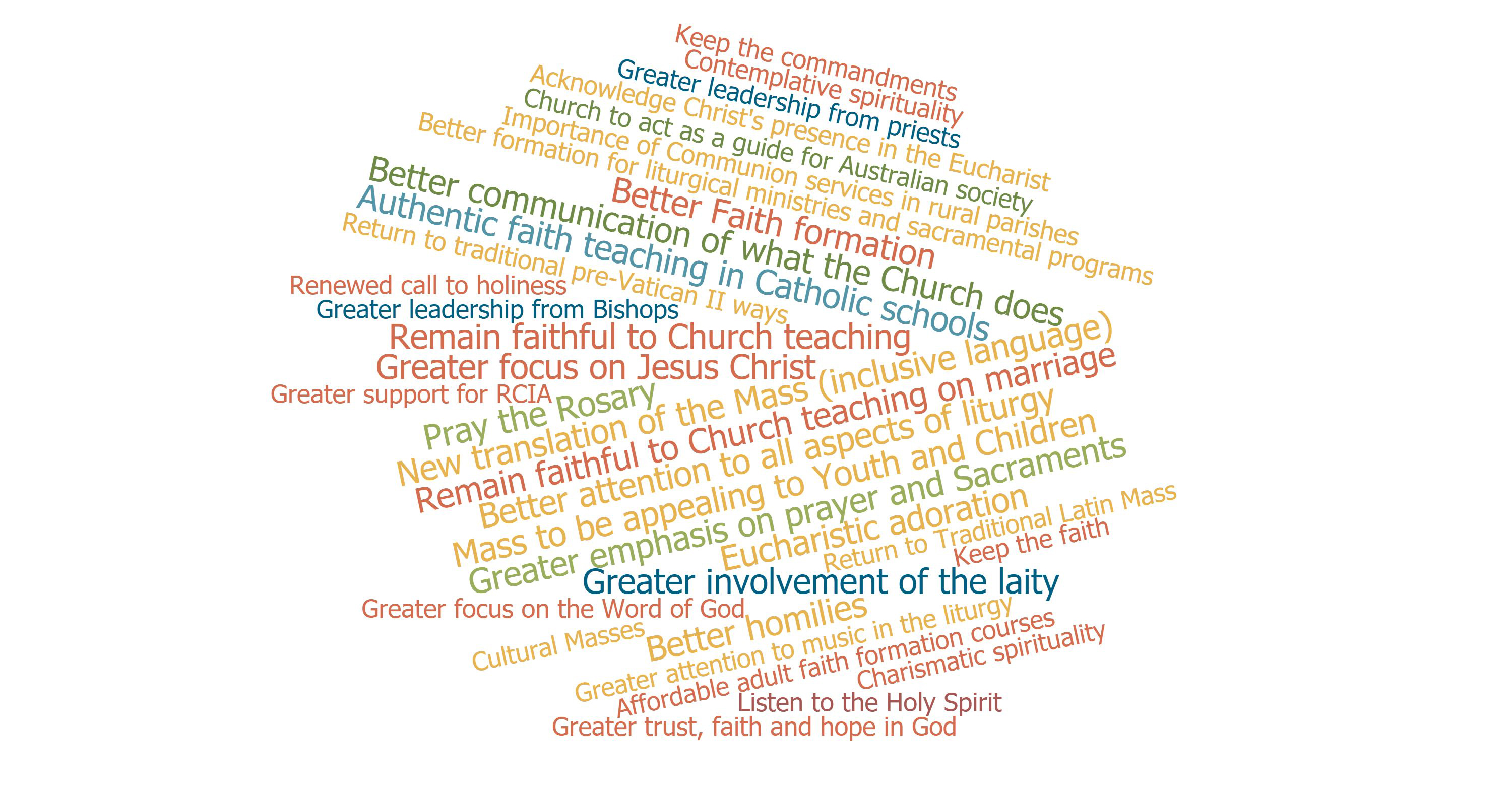
Disclaimer: Colour and size of text were randomly generated for aesthetic purposes and must not be taken as data visualization
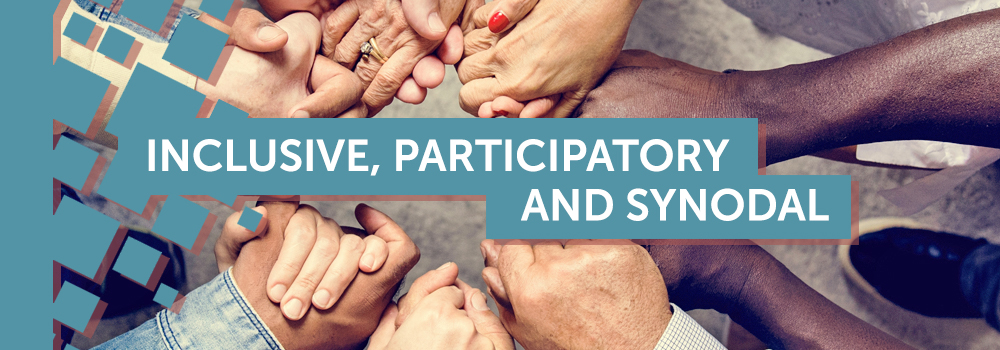
(Acts 4:32-33)
How is God calling us to be a Christ-centred Church in Australia that is inclusive, participatory and synodal?
As we move into this second stage of the Plenary Council journey we continue to seek the wisdom of the Holy Spirit. Beginning in July 2019, we are called to reflect on Scripture, Church teaching and our contemporary situation, in order to discern the answer to this question. The fruits of what is discerned during this time will help shape the agenda of the first session of Plenary Council in October 2021.
This National Theme for Discernment is inspired by the voices of the People of God who expressed a desire for individuals and groups within and also beyond the Church to find a better welcome and be incorporated more into her life and mission. There was a call to renew forms of governance and leadership in the Church, to find ways formally and informally of being co-responsible for ministry and mission, seeking structures and processes of collaboration, shared decision-making and financial co-responsibility in order to enable this greater involvement of lay people particularly of women, young people, people of diverse cultural backgrounds and people with disabilities. There was an expressed need for stronger connections across the many parts of the Church, and with other Christian traditions.
Responses to Discernment (Phase 2)
Read the Responses to Discernment for this theme so far.
Snapshot Report
See a sample of the voices and answers that inspired this theme. Use this to help your group during communal discernment.
More Reports
Download Diocesan Reports and "Listen to what the Spirit is Saying - Final Report for the Plenary Council Phase 1: Listening and Dialogue"
More Reports
Access the Thematic Paper by the Writing and Discernment Group or see papers for the other themes.

Chair
Peter Holmes 49, NSWAs an adult ‘convert’ to Catholicism, I am keenly aware of the need to focus and sharpen our efforts to be welcoming and inclusive of people from all walks of life, helpful to potential Christians and new arrivals, and provide ongoing support for all Catholics.
While I have great respect for the efforts of clergy and bishops, my experience has taught me that there are many models of leadership and engagement that can draw on the full range of talents, contributions and experiences of everyone who wishes to be involved in our mission. I am eager to be a part of this unique moment in the history of the Australian Church.
Members:
- Peter Bierer 38, SA
- Sr Clare Condon SGS 71, ACT
- Archbishop Anthony Fisher 59, NSW
- Catherine Garner 59, VIC
- John Honner 73, NSW
- Philippa McIlroy 31, VIC
- Carmel Ross 62, WA
- Shirley Quaresimin WA
- Bishop Bill Wright 67, NSW
What people talked about
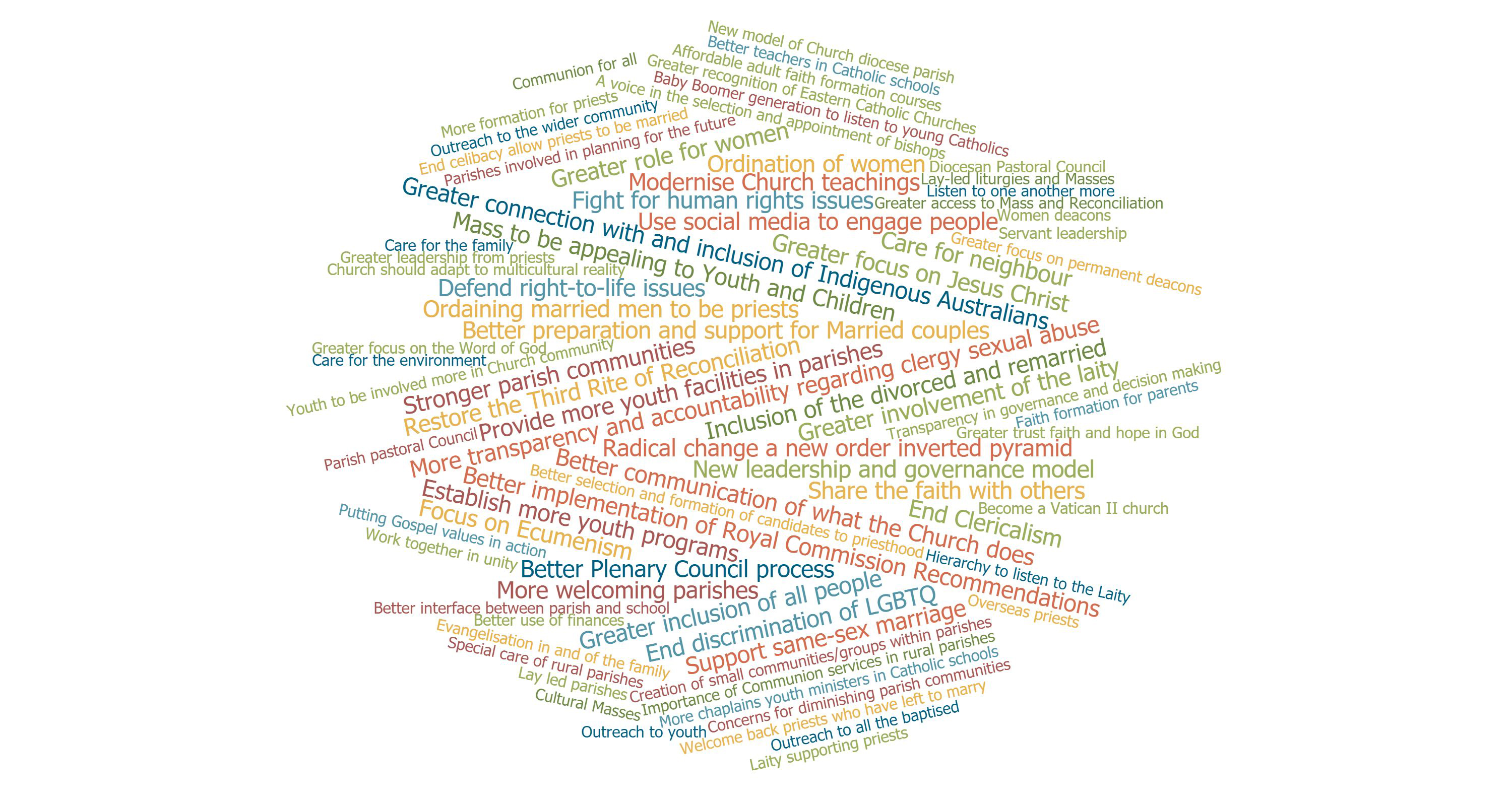
Disclaimer: Colour and size of text were randomly generated for aesthetic purposes and must not be taken as data visualization

(Acts 1:8)
How is God calling us to be a Christ-centred Church in Australia that is missionary and evangelising?
As we move into this second stage of the Plenary Council journey, we continue to seek the wisdom of the Holy Spirit. Beginning in July 2019, we are called to reflect on Scripture, Church teaching and our contemporary situation in order to discern the answer to this question. The fruits of what is discerned during this time will help shape the agenda of the first session of Plenary Council in October 2021.
This National Theme for Discernment is inspired by the voices of the People of God who shared a passion for participating in the missionary nature of the Church and desire stronger support, involvement and formation among all the baptised who make up the Church. The data also identified the need to reach out and communicate more effectively and to find new ways of living and proclaiming the Gospel in Australia today. There was a call for the strengthening of leadership and ministries in parishes and schools, training to equip leaders for ministry, pastoral support for various groups within parish and faith communities, and a desire for a unified voice in engaging social issues such as life and religious freedom.
Responses to Discernment (Phase 2)
Read the Responses to Discernment for this theme so far.
Snapshot Report
See a sample of the voices and answers that inspired this theme. Use this to help your group during communal discernment.
More Reports
Download Diocesan Reports and "Listen to what the Spirit is Saying - Final Report for the Plenary Council Phase 1: Listening and Dialogue"
Thematic Paper
Access the Thematic Paper by the Writing and Discernment Group or see papers for the other themes.
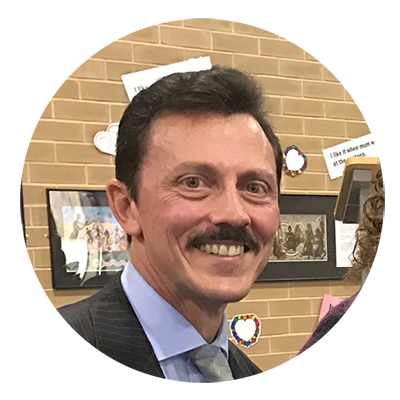
Chair
Peter Grace 49, NSW
The Plenary Council offers a once-in-a-lifetime opportunity for members of the Church in Australia to come together to consider how God is calling us to be a Christ-centred Church. Much of my professional and personal life has encompassed being “missionary and evangelising”, including through children’s sacramental programs and adult faith formation.
Members of a group, both individually and collectively, can seek and clarify God’s will through the presence of the Holy Spirit by harnessing the power of silence, by listening to God’s Word and the wisdom of each other, and by the power of prayer.
Members:
- Laura Avery 44, NT
- Fr Greg Bellamy 41, NSW
- Archbishop Peter Comensoli 55, VIC
- Sally FitzGerald 69, ACT
- Fr Vincent Glynn 61, WA
- Catherine Jenkins 57, VIC
- Fr Michael Kelly 68, VIC
- Daniel Lynch 32, WA
- Fr Patrick McInerney 61, NSW
- Alison Newell 66, NSW
- Francine Pirola 53, NSW
- Archbishop Julian Porteous 70, TAS
What people talked about
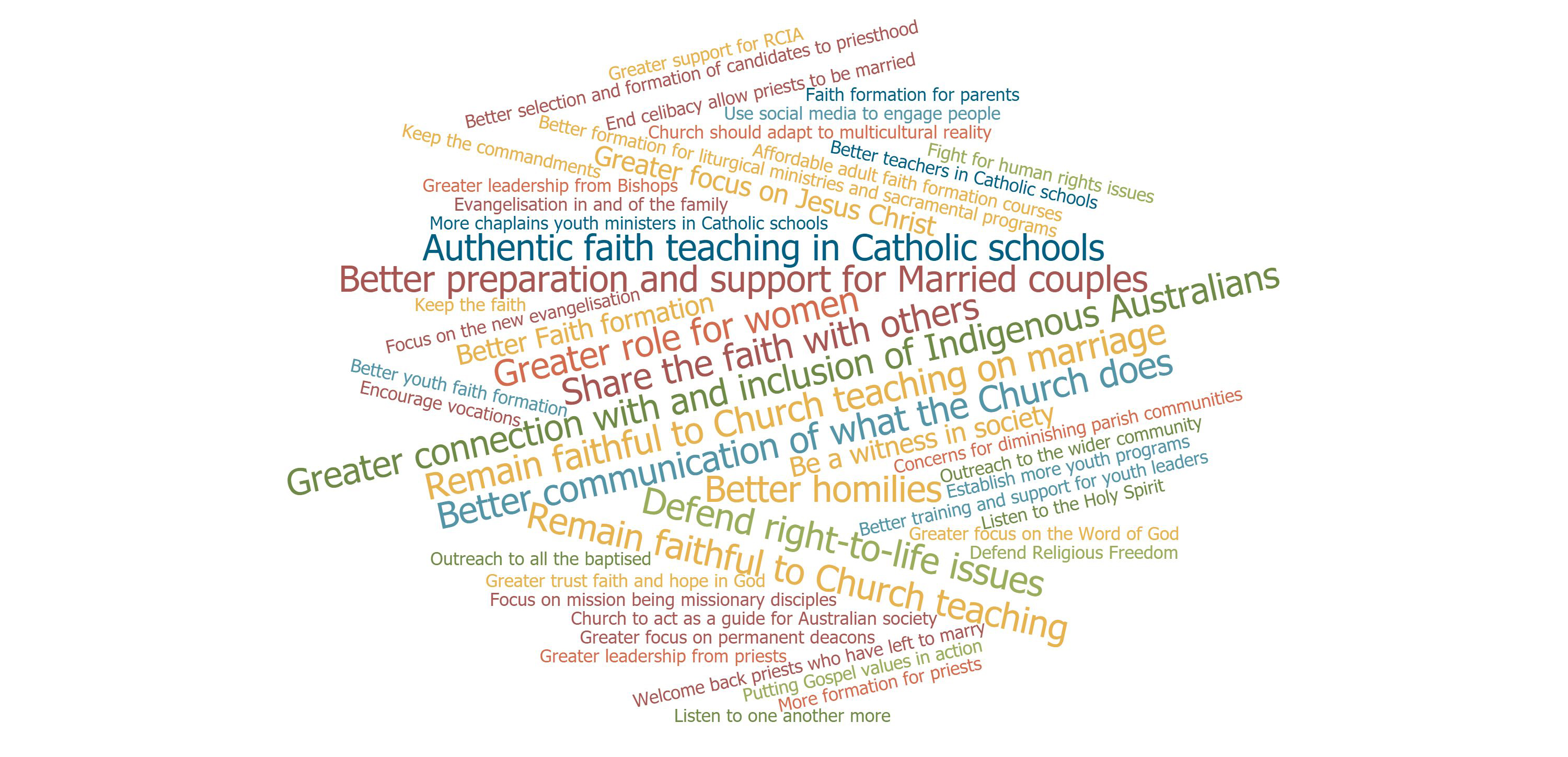
Disclaimer: Colour and size of text on were randomly generated for aesthetic purposes and must not be taken as data visualization
More Reports
Download Diocesan Reports and "Listen to what the Spirit is Saying - Final Report for the Plenary Council Phase 1: Listening and Dialogue"
Plenary Council 2020:
Listen To What The Spirit Is Saying…
![]()
In October 2020, the Catholic Church in Australia will gather for the first Plenary Council to be held since the second Vatican Council. In 2018, the entire People of God in Australia began preparing for this historic moment by listening to God, by listening to one another’s stories of faith.
More than 222,000 people participated in listening and dialogue encounters and contributed 17,457 submissions during the first stage of preparation for the Australian Plenary Council. The voices of the faithful help all of us to understand something of the historical experience and the current reality of the Catholic Church in Australia. This gathered data also reveals some deeper hopes and questions, and the diverse yearnings, that we are now challenged to consider together. The National Themes for Discernment named below are inspired by the data and call us toward the future.
On March 23, we announced more than 250 delegates for the Fifth Plenary Council of Australia, include delegates nominated by dioceses, eparchies, ordinariates and a personal prelature. The delegates will represent those local churches at the celebration of the Council over two assemblies – in Adelaide in October 2020 and in Sydney in mid-2021.
